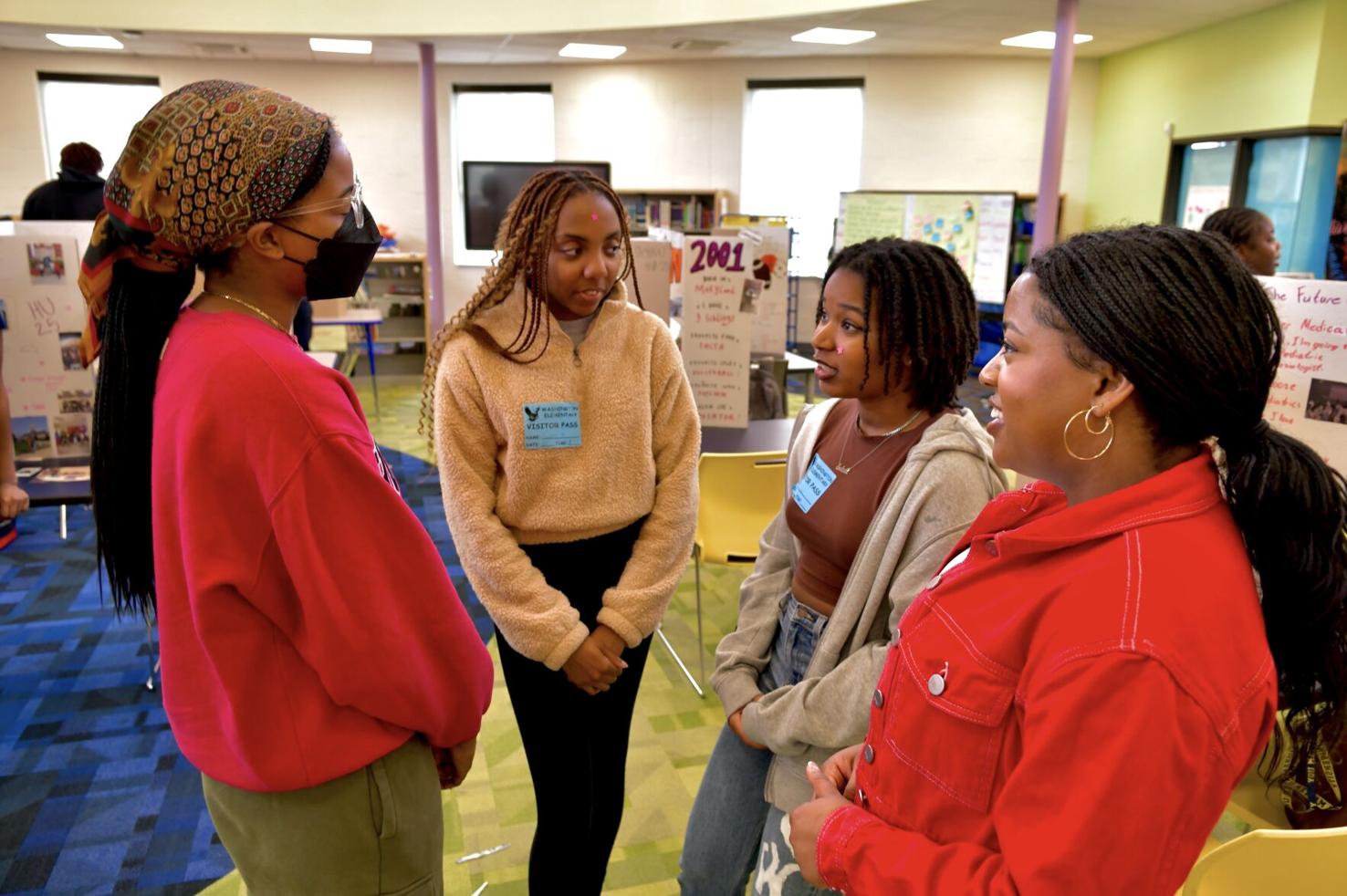By Sylvester Brown Jr.
As Lynn Squires, an English/Arts teacher at Washington EleMiddle School, walked into the room she shouted: “HU.”
The 15 or so college students, each standing next to personalized poster boards, responded in unison: “U know!”
The chant was a shared moment between Squires, a Howard University alumnus and HU students visiting Washington EleMiddle School of the Normandy Schools Collaborative.
Their visit is connected to “Alternative Spring Break” (ASB) where college students engage in volunteer service, typically for a week. The program originated in the early 1980s as a counter to “traditional” spring break trips.
Howard University has been a part of the ASB program for almost 30 years. As in past years, Squires has been instrumental in getting Howard students to visit Washington EleMiddle.
The spring break mission provides “service-learning opportunities in marginalized communities around the nation and the world” that involve students “in meaningful service projects to develop the next generation of servant leaders.”
On Tuesday, Washington EleMiddle hosted a “Meet and Greet” with some of its staff, Normandy Schools Collaborative Superintendent Dr. Michael Triplett and some of the visiting Howard students.
Squires became emotional when asked how she feels about Howard students visiting the school on Hanley Rd in North St. Louis County.
“It warms my heart because I was in their position at one time and I know how much Howard taught me and how much Howard expects of me,” Squires said. Having the students here at this moment, she continued, “let’s me know we’re doing the right thing and moving forward means a really good future with our students giving back.”
Sydnie Wardlaw,20, is a junior at Howard. She’s from Charlotte N. Carolina and plans to become an OBGYN with her own practice. She described Howard’s ASB program as “a really good initiative for communities and a great opportunity for students.”
Sydnie’s poster board offered pertinent and personal information about her, including her hobbies which include: “Traveling, shopping, going to concerts and cooking/eating.”
After spending about four days in St. Louis, Sydnie said she’s still enjoying “engaging and connecting” with the middle school students. She said she and her fellow Howard peers are “making an impact and building bonds” with the youth here.
Sydnie said she hopes to leave the students “with a feeling that we’re here for them and will support them in everything they do.”
Caleb Brantley,a 20-year-old sophomore at Howard, has similar sentiments.
“We’re working with Middle School kids teaching them certain things related to education and empowerment. We want to let them know that anything they set their minds to starts at this moment, right now.”
Caleb’s poster board informed students that he has a 3.87 GPA and that he’s on the dean’s list. It also explained that he’s majoring in political science with a major in criminology. Brantley said he plans “to go into law and politics.”
A Chicago native, Brantley said this was his first visit to St. Louis. He credits Howard University’s ASB program for the exposure. When asked what unique thing he plans to share with Washington EleMiddle students, he quickly answered, “inspiration.”
“We’re missing a sense of value in this country in terms of education and empowerment and investing that in our youth,” Brantley said.
“I think once we direct all these resources and knowledge and give students the power to want to do better, they will do better.”
Alternative Spring Break is a service learning program designed to connect students with distressed communities “and to explore the ethical and spiritual dimensions of leadership as it challenges students to discern how their unique gifts and skills can be used to address the problems of communities in need and the world at large,” according to a Howard release.
After Hurricane Katrina in 2005, ASB began taking students to New Orleans in an effort to rebuild the city. In 2009, the program was adopted by the office of Howard University president and the mission expanded to include the cities of Detroit, Chicago, and D.C.
The following year, Atlanta was added. In 2011, Haiti was selected as the first international destination in response to the displacement and devastation that occurred in the wake of the 2010 earthquake.
The next year, the program expanded domestically to include Memphis and Baltimore. In 2014, a few new sites were added, which included St. Louis, Newark, and West Virginia, bringing ASB to ten sites total.
On October 22, 2014, Howard University was named to President Barack Obama’s Higher Education Community Service Honor Roll with distinction, which is the highest federal award an institution can receive for service learning and civic engagement. ASB was the major focal point in this distinction.
After a year off because of the pandemic, ASB returned in 2022, and Howard University students worked with several St. Louis schools, including Sumner High School.

